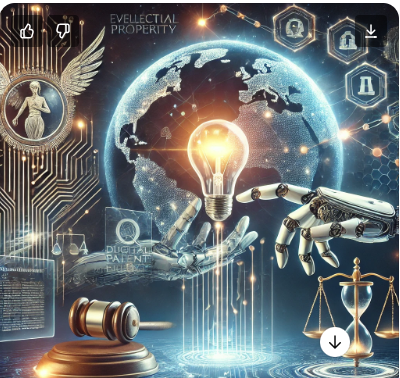
Marcus Julius Zanon, AI support. December 12, 2024
In 2024, the world of intellectual property (IP) was reshaped by the rapid evolution of artificial intelligence (AI), geopolitical tensions, and the growing demand for equitable access to technology. It was a year of breakthroughs, controversies, and reforms that highlighted the critical role of IP systems in shaping innovation and global progress. As we move into 2025, these challenges and opportunities will only grow, demanding new approaches and solutions.
Artificial intelligence dominated IP discussions in 2024. From AI-generated art to inventions, this technology has pushed the boundaries of what creativity and innovation mean. A heated global debate emerged: Should AI systems be recognized as inventors?
The U.S. and European Union upheld that inventorship must remain human, reflecting concerns about accountability and control. Meanwhile, countries like South Korea and Japan explored frameworks to include AI as co-creators, signaling a potential shift in how intellectual property law might evolve. As AI continues to revolutionize industries, the pressure to adapt IP laws to this new reality will intensify in 2025.
AI also transformed how IP is managed. Blockchain-based IP registries, particularly in Asia, began leveraging AI to streamline patent searches and protect trademarks. This combination of technologies promises faster, more transparent IP systems that could become the global standard.
The rivalry between China and the United States extended into the IP domain. China, determined to lead in AI and clean energy technologies, strengthened patent protections and enforcement. The U.S. responded with stricter trade measures, citing concerns over IP theft and unfair competition. These tensions created ripple effects, forcing smaller nations to navigate the divide while also influencing global trade and innovation policies.
Russia’s international isolation due to the Ukraine war further disrupted IP dynamics. Many Western companies withdrew their IP filings in Russia, leaving the country increasingly reliant on domestic innovation and partnerships with allies in Asia and Africa.
In the Global South, access to medicine and technology took center stage. Countries called for reforms to make life-saving treatments more affordable, challenging the current patent-driven model. The World Intellectual Property Organization (WIPO) became a battleground for these debates, highlighting the tension between incentivizing innovation and addressing global inequality.
Regions worldwide took significant steps to modernize their IP systems:
These regional initiatives demonstrated how collaboration and modernization can make IP systems more efficient and inclusive.
The digital age brought new complexities to IP in 2024. Copyright issues escalated as platforms hosting user-generated content faced stricter enforcement demands. Meanwhile, the explosion of non-fungible tokens (NFTs) created legal ambiguities around ownership and licensing. Countries like Japan and the UAE began crafting specific regulations to address these challenges, reflecting a global push for clarity in the digital IP landscape.
As the world moves into 2025, several trends will define the future of IP:
In 2024, intellectual property systems were tested like never before, challenged by rapid technological advancements, global inequities, and shifting political landscapes. Yet, the year also showcased the adaptability of IP frameworks and their potential to drive progress.
As 2025 begins, the IP world stands at a crossroads. Will it evolve to address the complexities of AI, climate change, and digital innovation? Or will it remain mired in outdated systems unable to keep pace with global needs? One thing is clear: the future of intellectual property will be pivotal in shaping the future of humanity.
“In the race to innovate, protect, and share, 2024 reminded us that IP isn’t just about ownership—it’s about the power to build a better world.”